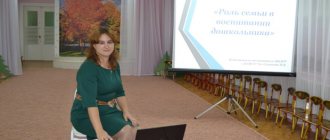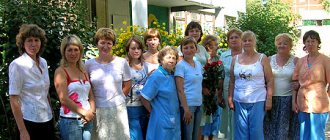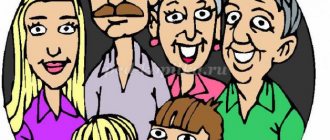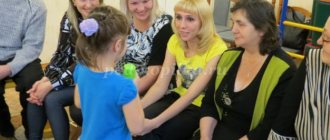Methodological literature on this issue
As a guru in methodological literature, I want to immediately turn to useful manuals that can provide invaluable assistance in preparing for a parent-teacher meeting.
I recommend paying attention to Tatyana Zenina’s guide “Parent meetings in preschool educational institutions,” which includes notes from meetings that help improve the pedagogical competence of parents. After all, without the help of parents, the efforts of the teacher in teaching and upbringing will be in vain. And parents should know about this and provide all possible assistance to teachers.
In order for parents to attend meetings and have a positive attitude towards this type of social activity, it is necessary that the meeting be interesting! This is very important today, since the monotonous sorting out of accumulated problems and current issues will tire even the most positively minded parents.
In connection with this, I would like to recommend the book “Scenarios for parent meetings in preschools. Modern models. Current topics." Anyone can simply gather parents and discuss pressing problems with them, but you need to try to captivate parents and make them take the most active part in all issues.
This is where original forms of work will come to the rescue, which can be presented in the form of business meetings, training games, meetings of family clubs, etc. Everything is described in detail in the recommended manual.
I also bring to your attention several electronic resources that you can also successfully use when developing a plan for meetings in a preschool educational institution:
- Innovative forms of interaction between preschool educational institutions and families. Parent meetings, conferences, discussions, workshops, round tables. Program for installation via the Internet.
- Innovative forms of interaction between preschool educational institutions and families. CD for computer: parent meetings, conferences, discussions, workshops, round tables.
To make the meeting more colorful, you can purchase a set of posters “Themes of parent meetings”, which includes 4 posters with methodological support. They are quite informative, so they will definitely help parents systematize and sort out the information they already possessed and learn something new.
Final parent meeting in junior group 1
Author: Belokur Lyubov Nikolaevna
Final parent meeting in junior group 1
Purpose of the meeting:
- summarize the joint activities of the teacher and parents over the past year;
- determine prospects for the future.
Tasks of the parent meeting:
- track the dynamics of the mental and physical development of children over the past year;
- identify individual problems in the development of children and outline ways to overcome them; promote the development of parental initiative and communication skills;
Duration of the meeting:
1 hour 30 minutes
Location:
music hall
Form:
parent evening
Equipment needed for this parent meeting:
- exhibition of children's creative works (drawings, crafts),
- presentation,
- reminders,
- questionnaires,
- musical accompaniment,
- certificates,
- candlestick with candle.
What should the teacher prepare for this parent meeting in the nursery group:
- preparing a presentation;
- design of an exhibition of handicrafts for children in the group;
- questionnaires, memos (Appendix 1), certificates;
- preparing performances by teachers at the end of the year in nominations;
Plan for holding a parent meeting in junior group 1:
- Opening speech by the teacher. Showing the presentation.
- Awards according to nominations.
- Handing out notices to parents
- Questioning.
- “Light a candle” (a moment of revelation).
- Final words from the group teacher.
Scenario for holding a parent meeting
1.Opening speech by the teacher
Good evening, dear parents! We are glad to meet you again!
This meeting takes place at the end of the year, let's take stock together, think about working on problems, celebrate achievements, and evaluate results.
Your children went to nursery for a whole year. They came so small, defenseless: they were afraid of everything and cried, and of course they called for their mother. Now look at what they have become, can you really say that they are crybabies and capricious ones. Of course not. They are very big here, they know how to eat themselves with a spoon, and they can put on pants, and they can sing a song, and read poetry, and how they can draw.
Our little helpers help us clean up the group and put away toys.
So that our children grow up healthy, agile and strong, we conduct physical education classes with them. We played outdoor games.
In music classes, we developed our students’ ear for music, taught them to listen to musical works, and developed artistic perception.
.Display of video
(presentation).
View fragments from the life of the group.
2..Awards for students according to nominations.
- The most adapted
- The strongest and most dexterous
- Most musical
- The most fun
- Best Artist
- Best reader
- The healthiest
- The most motherly
- Best helper
- The neatest
- The most talkative
- The best dreamer
- Best eater
- The friendliest
- The most friendly
- The smartest
- The smartest
- The most curious, etc. by the number of students in the group.
Parents are awarded certificates in the categories where their child achieved the best results.
3.. Presentation of memos to parents
Replenishment of the “Pedagogical piggy bank”, started at the beginning of the school year. We distribute printouts to parents on the topic of the development and upbringing of a child who will already be entering the 2nd junior group of kindergarten.
4..Questioning of parents (to determine a work plan for the future). In the questionnaire, fill in questions that will help you in your work as a teacher.
5. “Light a Candle” - A minute of revelation about those moments that were memorable in this first year of kindergarten.
The year has ended. What was it like for your family? What made you happy and what made you sad? Please tell us interesting stories and share your experiences about raising your child and his achievements during his time in kindergarten.
(Parents, passing a candle, accompanied by musical accompaniment, express their stories from the baby’s life and wishes.)
6..Final words from the teachers.
(With musical accompaniment)
Close your eyes and imagine a small star in your heart. Mentally we direct a ray of love towards her. The asterisk has grown. We direct the ray that brings peace. The asterisk grew larger again. I send a ray of goodness, the star has become even bigger. I direct rays to the star that bring health, joy, warmth, light, tenderness, affection. Now the star becomes as big as the sun. It brings warmth to everyone. Let it light your way in this sometimes difficult life.
Then the musical accompaniment continues for a few minutes, after which everyone exchanges wishes, says goodbye and disperses.
Appendix 1 Memo for parents
AGE FEATURES OF MENTAL DEVELOPMENT OF CHILDREN FROM TWO TO THREE YEARS OLD
· In the third year of life, children become more independent.
· Speech understanding continues to develop. Children continue to master the names of surrounding objects and learn to fulfill simple verbal requests from adults.
· The number of words understood increases significantly. Begins to understand not only the instructions, but also the story told by adults.
· Children's active speech develops intensively. By the age of 3, they are trying to construct simple sentences and use almost all parts of speech when talking with adults. The active vocabulary reaches approximately 1000-1500 words By the end of 3 years. speech becomes the child’s means of communication with peers.
· New types of activities are being formed: playing, drawing, designing. The main thing in the game is actions with game objects that are close to reality, in the middle of 3 years. actions with substitute objects appear.
· The child is already able to formulate the intention to depict any object. A typical image is of a person in the form of a “cephalopod” - a circle and lines extending from it.
· Visual and auditory orientation are improved, which allows children to accurately perform a number of tasks: select 2-3 objects by color, shape, size; distinguish melodies, sing.
· Phonemic hearing is improved. Children perceive all the sounds of their native language, but pronounce them with great distortion.
· The main form of thinking is visual and effective. The child actually acts with objects.
· Children are characterized by unawareness of motives, impulsiveness and dependence of feelings and desires on the situation. Children are easily infected by the emotional state of their peers. However, arbitrariness of behavior also begins to take shape. Children develop a sense of pride and shame. The child becomes aware of himself as a separate person, and an image of the Self is formed.
Memo for parents
"10 rules for raising a child"
- Love your child! Accept him for who he is, don't insult him, don't humiliate him, don't undermine his self-confidence, give him a reason to love you.
- Protect your child! Protect him from physical and mental dangers, sacrificing your own interests and risking your own life.
- Be a good example for your child! A child should live in a family where there is honesty, modesty, harmony, where the family is friendly, where the elderly are respected and loved.
- Play with your child! Give him time. Play the way he likes, take his games seriously.
- Work hard with your child! . Help him when he tries to participate in work. Teach him to participate in all housework.
- Let your child gain life experience, even if not painlessly, but on his own! Give him the opportunity to gain his own experience. An overprotected child often becomes a social invalid.
- Show your child the possibilities and limits of human freedom! It must be shown that any person must recognize and observe certain limits in his actions in the family..., in the team... and in society.
- Teach your child to be obedient! Parents are obliged to monitor the child’s behavior and guide him in such a way that his actions do not cause harm to himself or others.
- Expect from your child such opinions and assessments as he is capable of in accordance with his stage of maturation and his own experience!
- Provide your child with the opportunity to have experiences that will have the value of memories!
comments powered by HyperComments
Preparing a parent meeting plan
To ensure your meeting runs smoothly, you need to think about how to sequence the issues to be discussed. If we are talking about a meeting for a younger group, and the first meeting in this group, then we need to start it by introducing ourselves.
It is clear that your parents already know you, but if you say a few words about yourself, about your teaching experience, about that. What technologies and principles of education you put in first place, this will speak of you as a real specialist who knows his business.
In the middle group, this information can be repeated if your principles and technologies of work have changed or improved, and also if new students have been added to the group whose parents are not aware of your educational route.
After meeting, we announce the topic of the meeting. Despite the fact that quite a lot of different issues have to be resolved within the framework of a meeting, your meeting should have a specific topic, educational, educational, or it could be timed to coincide with some holiday.
At your request or if necessary, you can invite specialists who will help you delve deeper into this topic and reveal it as much as possible. This could be a psychologist, social educator, doctor or methodologist in your garden. Thus, a psychologist will reveal the educational aspects of the relationship with children, a teacher will reveal social aspects, a doctor will introduce the features of preserving children’s health, and a methodologist will talk in more detail about the educational process.
Presentation of parents' meeting, senior group. presentation for the lesson (senior group)
Slide 1
Parent meeting in senior group No. 3 “Tsvetiki” of GBDOU No. 12 of the Nevsky district, St. Petersburg. Educator: Grinkevich Alexandra Igorevna.
Slide 2
Agenda: 1) Organizational issues for this period; 2) Consider the age and individual characteristics of children 5-6 years old; 3) Regime moments; 4) Introduce parents to the tasks and features of educational work, the tasks of the preschool institution for the new school year; 5) Update the personal data of the families of the pupils;
Slide 3
Dear parents! Congratulations to all of you on the beginning of the new school year. We are very glad to meet you and your children in our kindergarten. Over the summer, all the children have grown so much and become even older. Our children have become a year older and moved to the senior group. We congratulate you on this!
Slide 4
Age characteristics of children aged 5-6 years. Features of the development of a child 5-6 years old. This period of a child’s life is usually called senior preschool age. At this time, your child is actively learning about the world, relationships between people, and is ready to acquire specific knowledge that will gradually prepare him for school. Personality development of a 5-6 year old child. The most important innovation in the development of the personality of a 5-6 year old child can be considered the emergence of voluntariness, that is, the ability to independently regulate one’s behavior. Children, without being distracted by more interesting things, can complete unattractive work (put away toys, tidy up the room, etc.). This becomes possible thanks to children’s awareness of generally accepted norms and rules of behavior and the obligation to comply with them. Significant changes occur in the child’s idea of himself, of his Self. At this age, the child already has a fairly good idea of what qualities he possesses, and ideas begin to appear about what qualities the child wants to have, what he would like to become. That is, children begin to understand the categories of desirable and undesirable traits and characteristics. But since this process is just beginning, the child does not have a separate idea of what he should be, so he usually wants to be like the heroes of fairy tales, films or familiar people. This important new formation in the child’s personality is the beginning of the emergence of educational motivation. That is, what motivates a child to learn is not so much an interest in disciplines as the desire to see himself as “smart,” “knowledgeable,” “skillful,” especially in comparison with his peers. By the age of 5-6, children are able to listen carefully to the teacher, understand and retain the goal of the lesson. But provided that the motive for action is significant, and for this it is necessary to use a game structure in teaching.
Slide 5
It is at this age that a peer becomes very important for a child. The assessments and opinions of their comrades become important to them. There is a division of children into more noticeable and “bright” ones, who are liked by their peers, and less noticeable ones, who are not popular among children. When assessing the actions of their peers, children are often categorical and demanding, while in relation to their own behavior, as a rule, they are more lenient and insufficiently objective. The formation of a child’s social status and his personal self-esteem largely depends on the assessment of the adults around him and, first of all, his parents. By the age of 5-6, the child acquires an understanding of the system of primary gender identity, that is, he clearly understands the qualities that a man and a woman possess, the characteristics manifestations of feelings, emotions, specific behavior, appearance, profession. And as a result, when choosing peers of the opposite sex in communication, boys rely on qualities of girls such as beauty, tenderness, affection, and girls rely on qualities such as strength and the ability to stand up for another. The intellectual horizons of children are expanding. Their interests gradually extend beyond the immediate environment of the kindergarten and family. Children are actively interested in the surrounding social and natural world, unusual events and facts. At the same time, the child tries to independently comprehend and explain the information received. By the age of 5, children can be called “little philosophers” who independently make small “discoveries” every day. Children are also ready to listen with great interest to stories from the lives of their parents and grandparents.
Slide 6
The main directions of children's development, educational areas: Physical development, Artistic and aesthetic development, (Music, Drawing, Modeling / Applique), Familiarization with the outside world, Speech development, FEMP Mathematics. ;
Slide 7
Mathematics A high level of development of mathematical concepts presupposes: The ability to independently examine, compare, contrast geometric bodies and figures by length, width, height, volume, mass; Determine your location among surrounding objects and the direction of movement (straight, left, closer, inside the circle, etc.); Mastering time relations (days of the week, parts of the day, names of months); Mastering quantitative and ordinal counting within 10 and numbers from 0 to 9; comparing numbers, equalizing inequalities; determining the composition of numbers from ones and two smaller ones within 5; The ability to measure time periods (5 - 10 minutes) using an hourglass, and distance using a conventional measure; The idea of the invariability of quantity and size (mass, volume) regardless of conditions;
Slide 8
Speech development Achievements of the child by the end of the school year. In coherent speech: Independent construction of gaming and business dialogues. Retelling of literary works; In descriptive stories, precise and correct choice of words, using adjectives and adverbs; Writing narrative stories based on a picture and from personal experience in accordance with the logic of the narrative; Listening carefully to the stories of peers, identifying speech errors and correcting them kindly; In mastering the dictionary: Mastering and using new words in speech (names of professions, institutions, equipment, tools of work; words denoting shades of color; personal characteristics of a person (honesty, justice, kindness), his condition and mood; combining objects into groups based on essential features and naming them (furniture, vegetables, transport)
Slide 9
The world around us Achievements of the child by the end of the year: Formation of ideas about living and inanimate nature, seasonal changes in it and human activities; Plants, mushrooms, animals as representatives of living things in the natural world; their basic life functions and needs, habitat; About natural communities of animals and plants, their relationships and features of adaptation to the environment and seasonal changes in it; Man as a living being, his similarities and differences with other living beings; human environmental activities; About the value of nature as an environment for human life;
Slide 10
Artistic and aesthetic development Mastering the technical skills of fine art In drawing: the use of various materials and tools (pastels, crayons, watercolors, stained glass paints, gel pens, felt-tip pens), using a palette, creating new color tones and shades; various methods of painting with a brush (all bristles, the end of the brush, dipping, etc.) In applique: the use of various materials (paper, fabric, natural and waste materials); mastering the technique of symmetrical and openwork cutting, cut-out and volumetric appliqué, collage; cutting out circles and ovals, short and long strips, etc. In modeling: the use of various materials (plasticine, dough, snow, sand, wax); creation of three-dimensional and relief images (drawing with plasticine, prints, drawing with stacks); modeling in a constructive and mixed way, smoothing the surface of an object, sculpting small details; creation of multi-figure compositions;
Slide 11
Memo for parents! It is important to know! Memo "Rules for parents." 1 . Bring your child to kindergarten before 8.30 am; in clean, neat and comfortable clothes and shoes, with the necessary set of change of underwear, with neatly combed hair and short-cut nails; healthy (notify the teacher of any cases of child illness). 2. Patients and children suspected of having the disease identified during the morning reception are not accepted into the kindergarten. 3. Inform the teacher about the child's absence due to illness on the day of illness 4. After suffering from an illness, as well as absence from kindergarten for more than five days, a certificate of the child’s health from the local pediatrician is submitted. 5 . Personally hand over and pick up the child from the teacher. You need to write an application addressed to the manager if you entrust the right to pick up a child to relatives or children over 16 years of age. 6. On the eve of the child’s expected absence from kindergarten due to family reasons (vacation, summer, sanatorium treatment, etc.), leave a statement to the manager. 7. Pay the fee for keeping your child in kindergarten no later than the 10th day of each month. Promptly submit documents confirming benefits for paying for maintaining a child in kindergarten. 8 . Comply with ethical standards when communicating with children and kindergarten employees.
Slide 12
Parental Committee Currently the parent committee includes: Vorezhnikova Alexandra Vladimirovna Artyukova Anzhelika Yuryevna Bogdanova Maria Vladimirovna Mikhailenko Svetlana Igorevna Don’t forget that you can vote remotely and either re-elect or leave the parent committee with the same composition. The Parents' Committee is given the right, on behalf of all parents, to make decisions and assist teachers in solving organizational issues.
Slide 13
Schedule of continuous educational activities
Slide 14
We want to end our meeting with these beautiful lines: Take the cup of patience, Pour a full heart of love into it, Throw in two handfuls of generosity, Sprinkle with humor, Sprinkle with kindness, As much Faith as possible, Stir, Then spread on a piece of the life allotted to you And offer to everyone Whom you meet On his way
Additional nuances
Next, we introduce parents to the website of the educational institution, give them the address in printed form or ask them to write it down, because there they can follow all the kindergarten news and the successes of their children, and will also find a lot of other useful information. Let us write down other important information, including our telephone numbers where we can contact you. But in order not to waste time, it is better to print it all out in advance and distribute it to each parent.
The next point in the plan must include your detailed story about the educational program in the garden, which classes the children will be required to attend, and which will be presented in the form of elective clubs. By the way, some of them may be paid - this should also be mentioned.
Next, you talk about what is required from parents regarding education (homework, control, creative materials, manuals, etc.). And then you can begin to resolve other issues related to logistics, health or other aspects.
In the senior and preparatory groups, other issues may be additionally considered. So, in the kindergarten graduation group, starting in September, they often discuss holding their students’ graduation, develop a script, come up with entertainment, plan a budget and other nuances.
At the end of the meeting, it is necessary to thank parents for their attention and invite them to ask questions that interest them. That's probably all. If I missed something in a hurry, please add it in the comments. I look forward to your likes on social networks and new subscribers.
Sincerely, Tatyana Sukhikh! Till tomorrow!



